Consulting phone:
135-3037-2041
(Mr.Wang)
Product introduction:
Farad capacitor, also known as double capacitor, gold capacitor and supercapacitor, is a chemical element developed from the 1970s and 1980s. Supercapacitors store energy through polarized electrolytes without chemical reaction, and the process of energy storage is reversible, which is precisely because this supercapacitor can repeatedly charge and discharge hundreds of thousands of times. The difference between Farad capacitor and ordinary capacitor is the difference in capacity.
Product performance table:
series | model | LIC 0813 | LIC 0820 | LIC 1313 | LIC 1020 | LIC 1320 | LIC | LIC | LIC 1840 | |
4.1 | Operating temperature | -40℃-85℃ | ||||||||
4.2 | Operating Voltage | 2.5V-3.8V | ||||||||
4.3 | mixed voltage | 2.5V | ||||||||
4.4 | Standard capacitance (@25±2℃) | 20F | 40F | 70F | 80F | 120F | 250F | 500F | 750F | |
tolerance | -20%~+80% | |||||||||
4.5 | Resistive AC (1KHz, 3.8V) | ≤ 500mΩ | ≤ 200mΩ | ≤ 175mΩ | ≤ 150mΩ | ≤ 100mΩ | ≤ 50mΩ | ≤ 40mΩ | ≤ 25mΩ | |
4.6 | Discharge current | continuous | 100MA | 200MA | 200MA | 250MA | 500MA | 750MA | 2.0A | 3.0A |
Pulse (1 second) | 0.5A | 1.0A | 3.0A | 3.0A | 5.0A | 10.0A | 20.0A | 30.0A | ||
4.7 | Charging voltage/current | 4.2V 200mA | 4.2V 300mA | 4.2V 500mA | 4.2V 500mA | 4.2V 1A | 4.2V 2A | 4.2V 3A | 4.2V 3A | |
4.8 | Mass (G) | ≤1.5 | ≤2.0 | ≤3.0 | ≤3.0 | ≤5.0 | ≤8.0 | ≤15.0 | ≤20.0 | |
4.9 | Storage conditions | +10℃-50℃60%RH | ||||||||
Product Size:
series | φD(mm) | Length(mm) | φD(mm) | P (mm) | Weight (G) | ||||||
BTLIC0813RS3R8020 | 08±1.5 | 13±1.5 | φ0.6±0.1 | 3.5±0.5 | ≤1.5 | ||||||
BTLIC0820RS3R8040 | 08±1.5 | 20±1.5 | φ0.6±0.1 | 3.5±0.5 | ≤2.0 | ||||||
BTLIC1313RS3R8070 | 13±1.5 | 13±1.5 | φ0.6±0.1 | 5.5±0.5 | ≤3.0 | ||||||
BTLIC1020RS3R8080 | 10±1.5 | 20±1.5 | φ0.6±0.1 | 5.5±1.5 | ≤3.0 | ||||||
BTLIC1320RS3R8120 | 13±1.5 | 20±1.5 | φ0.6±0.1 | 5.5±0.5 | ≤5.0 | ||||||
BTLIC1620RS3R8250 | 16±1.5 | 20±1.5 | φ0.8±0.1 | 7.5±0.5 | ≤8.0 | ||||||
BTLIC1640RS3R8500 | 16±1.5 | 40±1.5 | φ0.8±0.1 | 7.5±0.5 | ≤15.0 | ||||||
BTLIC1840RS3R8750 | 18±1.5 | 40±1.5 | φ0.8±0.1 | 7.5±0.5 | ≤20.0 |
Product display:
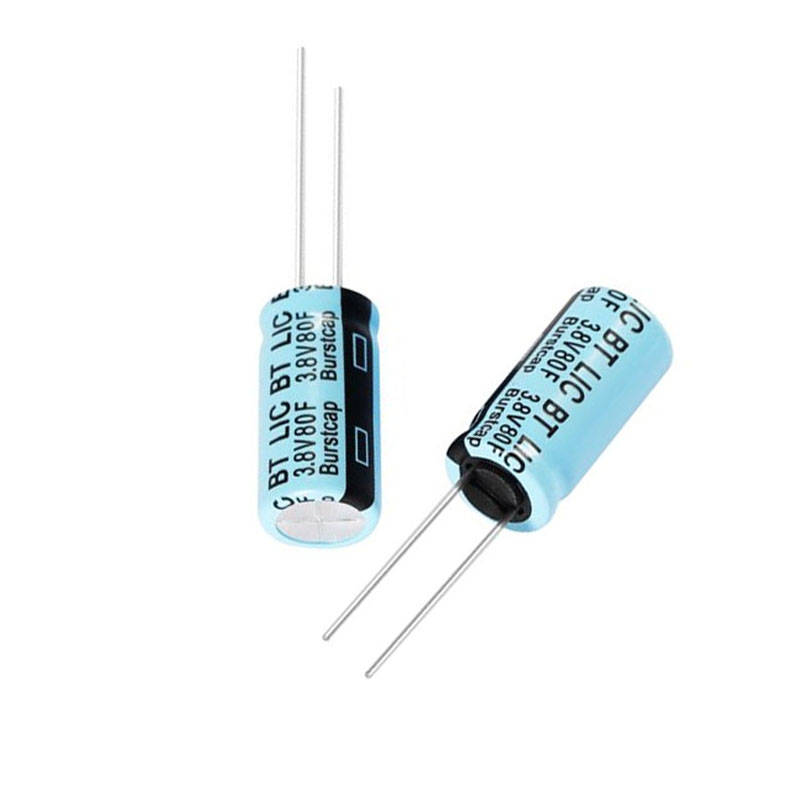
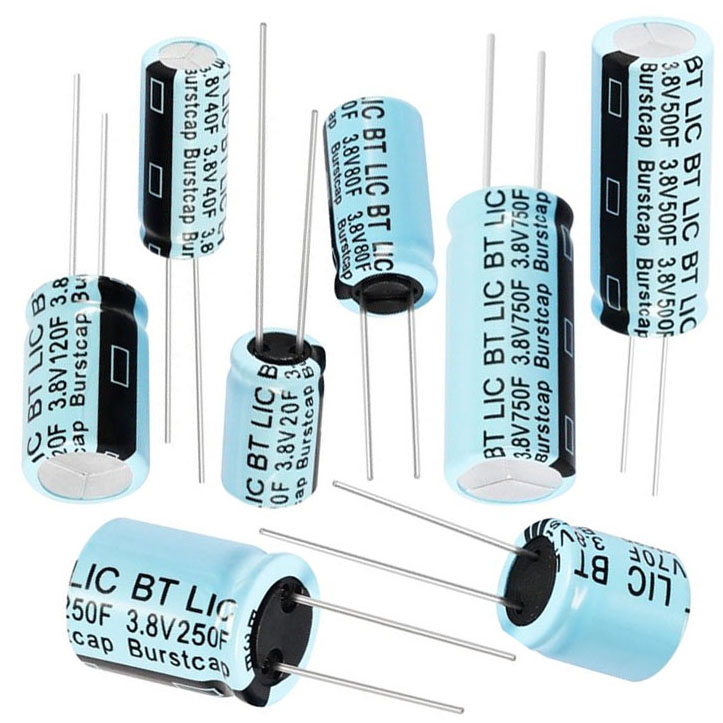
Product Description:
We are lithium-ion capacitor battery, NOT the ordinary lithium-ion battery!
YKY lithium-ion capacitor battery is a new type of high-power battery made by mixing super capacitor and lithium ion battery; one of its electrodes is activated carbon electrode of super capacitor, and the other is lithium ion battery electrode! Therefore, it enjoys the advantages of both of the lithium-ion battery and super capacitor!
1.Ultra-large Capacitance, much larger than ordinary capacitor.
2. High Power Density. The power that can be released instantly is nearly ten times higher than that of ordinary batteries without damaging the batteries.
3. Long Cycle Life. The charge and discharge cycle life is more than 30000-100,000 times, which is one of the biggest advantages. Traditional batteries can only be charged and discharged hundreds of times.
4. Excellent Low Temperature Charge and Discharge Performance. Compared with traditional lithium-ion batteries which will be significantly reduced at low temperatures, YKY lithium-ion capacitor battery can be used normally in an ambient temperature of 40 to 60 degrees.
5. Small Leakage. With super charge retention ability, the leakage is very small, while the traditional battery needs to be charged frequently to maintain the state.
6. Ultra-fast Charging. The charging speed is dozens of times faster than ordinary batteries, and it can fully charge the power required by a car in a few minutes.
7. Environment Friendly & Maintenance-free. It will not cause pollution to the environment itself, and it is truly maintenance-free, while traditional batteries are still pollute the world we live.
Internal resistance, capacity, self-discharge :

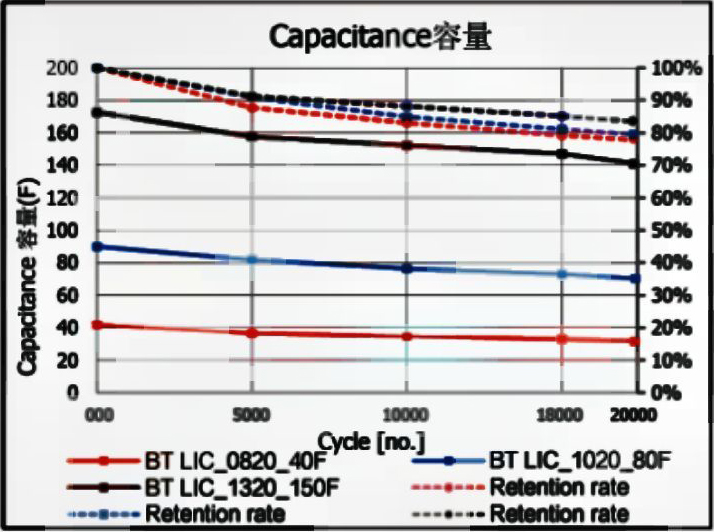
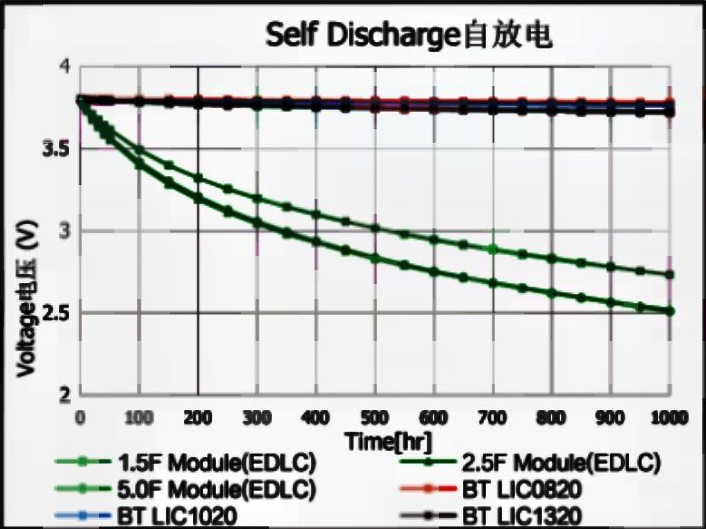
Packaging Specifications:
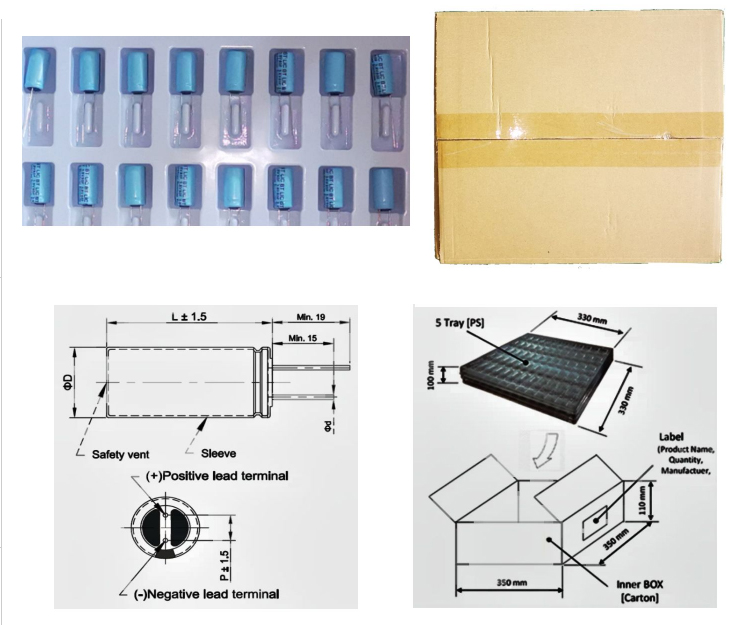
Precautions:
1. Use
1. The operating temperature of lithium-ion capacitors should not exceed the upper or lower limit of the rated temperature (-20 degrees to +55 degrees)
2. Lithium-ion capacitors should be used at nominal voltage. At the same time, in order to prolong the service life of the product, it is recommended that the monomer be used within the range of " rated voltage " (2.5v-3.8v).
3. Please confirm the polarity of lithium-ion capacitors before use, and avoid reverse connection.
4. The external ambient temperature has a heavy impact on the life of lithium-ion capacitors, please keep away from heat sources.
5. Do not directly touch water, oil, acid or alkali for lithium ion capacitors.
6. Do not knead, nail, or disassemble Li-ion capacitors.
7. Do not discard lithium-ion capacitors at will. When discarding, please dispose of them in accordance with national environmental protection standards.
2. Storage
1. During the transportation of lithium-ion capacitors, avoid violent vibration, kneading, rain and chemical corrosion, and handle with care.
2. Lithium-ion capacitors should not be placed in places with a relative humidity of more than 85% or containing toxic gases. In such an environment, the leads and casings are susceptible to moisture and corrosion, resulting in circuit breakers for ultra-fast rechargeable batteries.
3. If the lithium-ion capacitor needs to be stored for a long time, please store it in a place with a temperature of -40~35 degrees, a relative humidity below 50%, and good ventilation.
testing method:
capacity
1 Constant current discharge method
(1) Measurement circuit
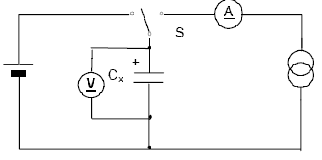
Figure 1 - Constant Current Discharge Method Circuit
2 Measurement method
◎ The DC voltage of the constant current/constant voltage source is set to the rated voltage (UR ) .
◎ Set the constant current value of the constant current charging and discharging device specified in Table 1.
◎ Switch the switch S to the DC power supply, and charge it with constant voltage for 30 minutes after the constant current/constant voltage source reaches the rated voltage.
◎ After charging, switch the switch S to a constant current discharge device to discharge with a constant current.
◎ Measure the time t1 and t2 of the voltage across the capacitor from U1 to U2, as shown in Figure 2, and calculate the capacitance value according to the following equation :
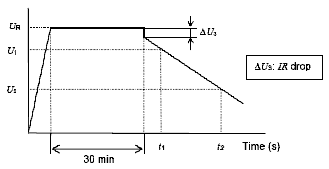
Figure 2 Terminal voltage characteristics of capacitors

in
C capacity (F);
I discharge current (A);
U1 measures the initial voltage (V) ;
U 2 measures the termination voltage (V);
t 1 Time (s) for the discharge voltage to reach U1;
t 2 Time (s) for the discharge voltage to reach U2.
See Table 1 for the discharge current I and the voltages U1 and U2 at which the discharge voltage drops .
3 Equipment: A, ARBIN supercapacitor test system B, linear DC stabilized power supply C, constant current discharge device D, voltage recorder
Internal resistance
Test method: AC impedance method
Measurement circuit
The measurement circuit shown is tested.
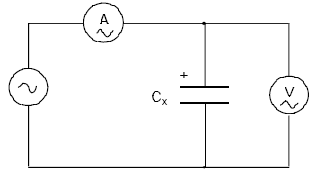
Figure 3 - AC Impedance Method Circuit
Measurement methods
The internal resistance Ra of the capacitor should be calculated by the following formula:

in
Ra AC internal resistance (Ω);
U RMS value of AC voltage (V rms);
I AC current rms value (V rms).
The frequency at which the voltage is measured, should be 1kHz.
The AC current should be 1mA to 10mA.
优点:
1.超大电容法拉,远大于一般电容器.
2.电源可释放当即近十倍高于一般电池,它不会损坏.
3.充电和放电循环寿数大于 30000 ~ 100,000 倍,这是最大的优势之一.传统的电池只能被充电和放电几百次了.
4.能够运用通常在环境温度 40 度到 60 度,功能的传统电池将大大降低在低温下.
5.具有超强的电荷坚持能力,走漏很小,传统的电池需求充电常常坚持状况.
6.充电速度快,它的速度是数十倍的速度比一般电池,它能够彻底充电所需求的功率车几分钟后就到.
7.它不会对环境造成污染,这真是免维护,而传统的电池还污染了.

